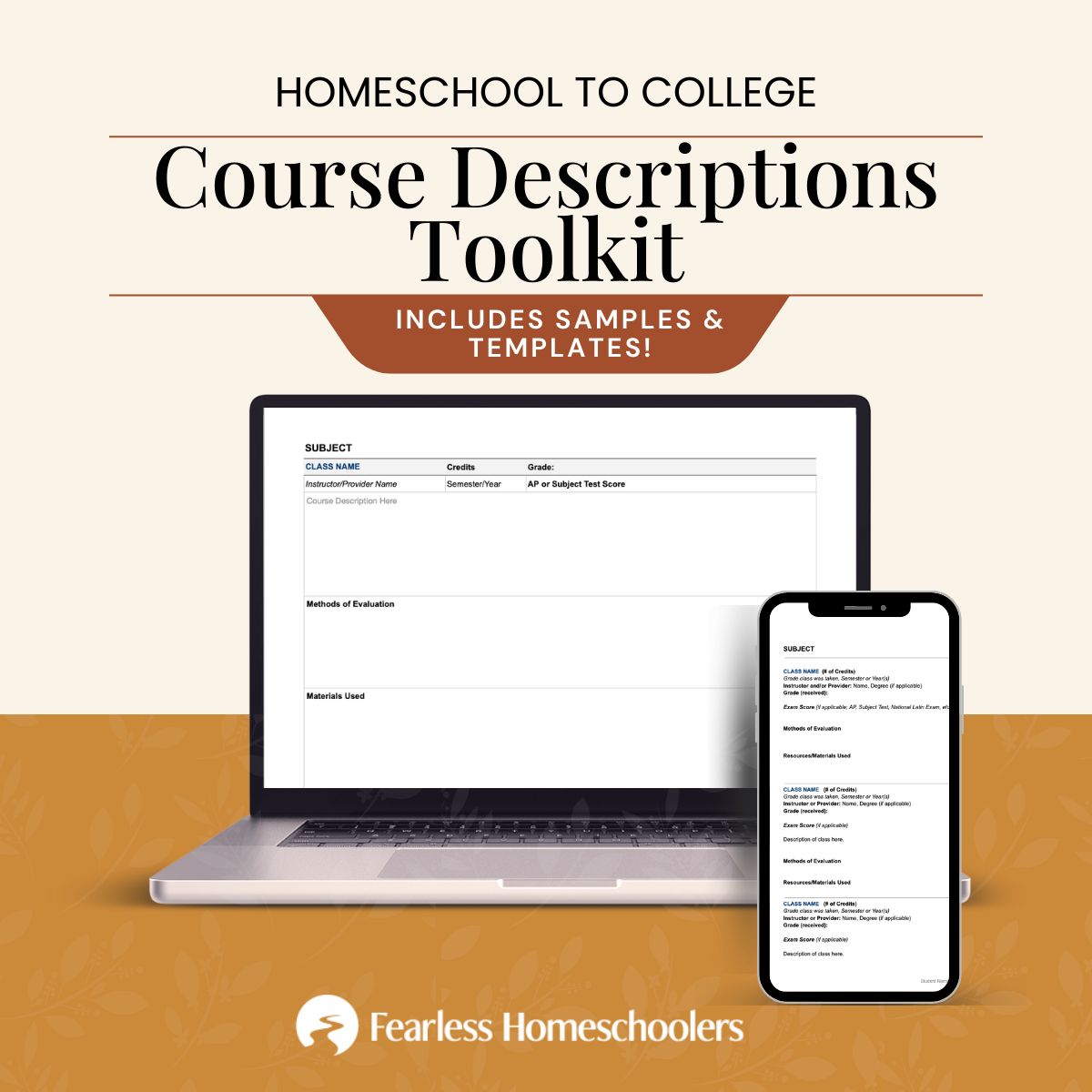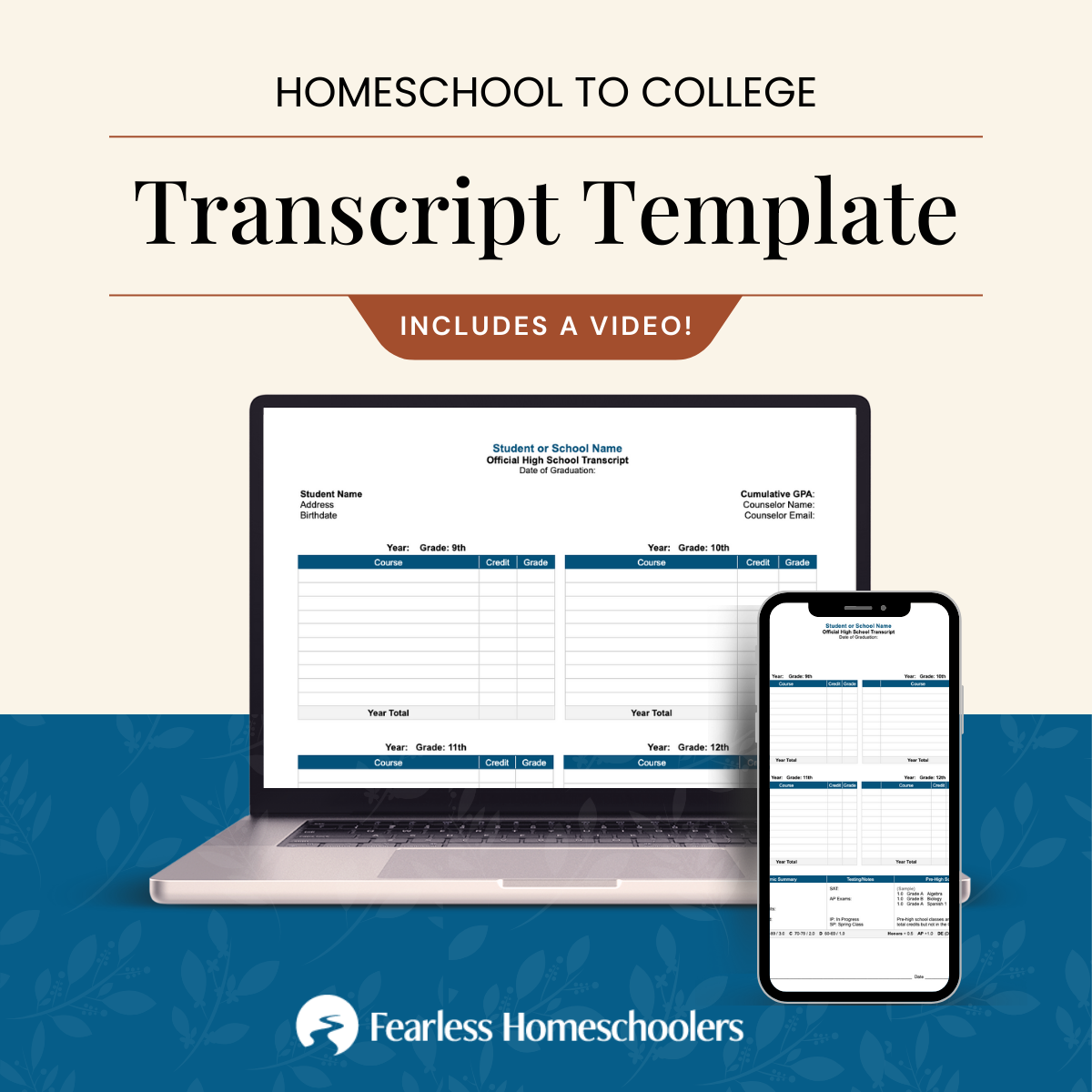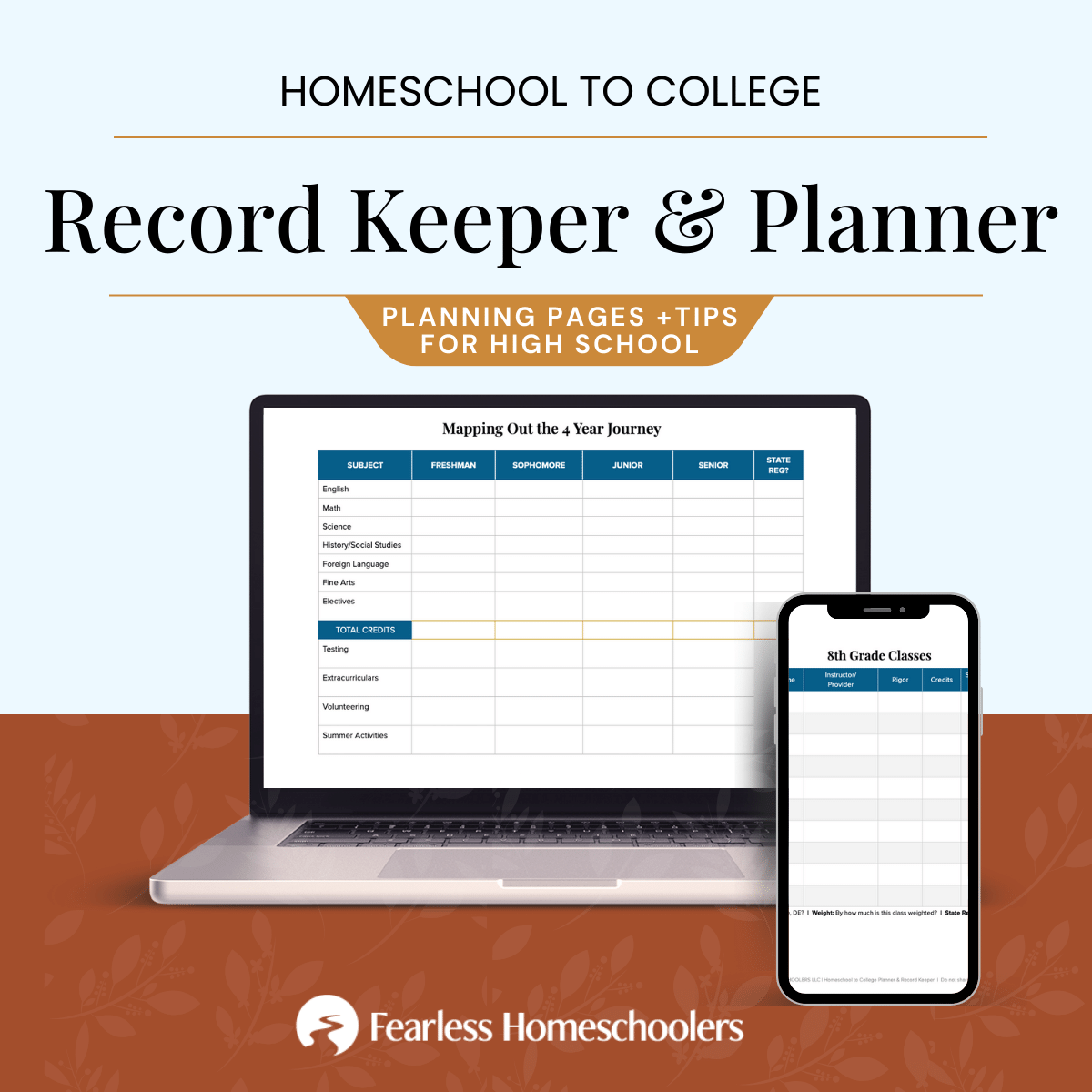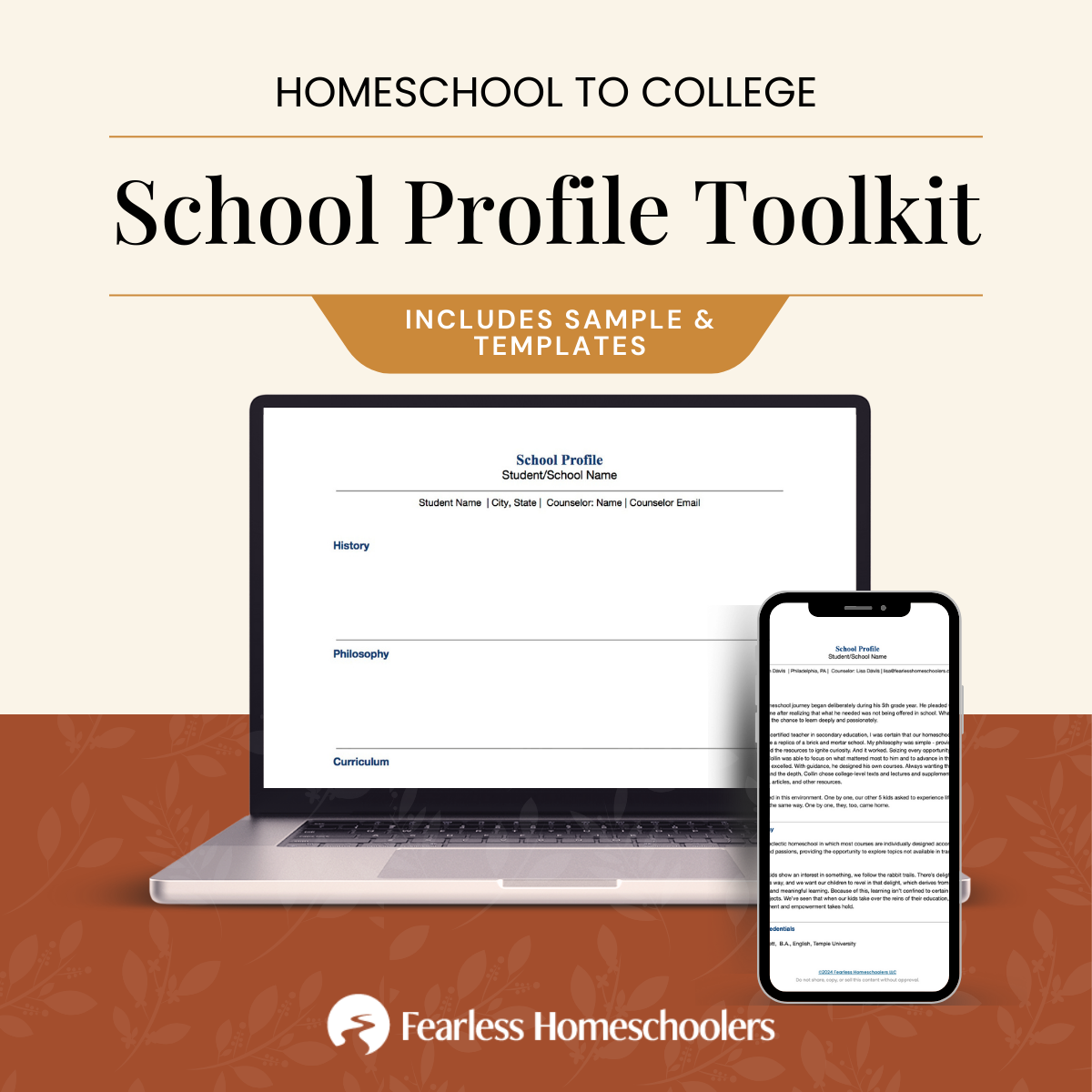How to Write Homeschool Course Descriptions For College Applications
We own an Airstream. Her name is Beauty.
Lately, we’ve been camping at farms gracious enough to host us. Think cows and corn fields and open skies.
On our recent trip to Ohio, Farmer John had just completed his corn maze for the fall and he was super proud.
The design was intricate and clever and meaningful. And he was thrilled to show me how he did it.
Using graph paper and a number 2 pencil, he planned every detail well in advance. Sure, there were hiccups as the tractor took down a corner of the letter “E”, but for the most part this year’s maze was his best yet.

For homeschoolers, college applications can feel like a huge maze. So many paths to take; we don’t know which ones to choose.
Course descriptions are a path many homeschoolers don’t even consider. And I wish they would.
What You’ll Learn in This Post
- Why homeschoolers should submit course descriptions
- What colleges really expect (even when they don’t say it)
- The 5 key elements every course description template needs
- How to make yours stand out - without sounding like a public school catalog
- I’ll share my favorite template to make writing these a breeze.
What Are Homeschool Course Descriptions?
For homeschoolers applying to college, course descriptions are a document that provides a brief overview of each high school course taken by the homeschool student.
Every course listed on the homeschool transcript should have a detailed description in this document - even those courses that are scheduled but haven’t yet been taken or completed.
Because of its detailed format, this document can be up to 10-15 pages long…sometimes more.
Are Course Descriptions the Same as a Transcript?
Some homeschoolers confuse the term course descriptions with the transcript. They’re not the same thing.
Whereas course descriptions are detailed and lengthy, a transcript is a one-page document that simply lists course names, grades, credits, and GPA. When I refer to the transcript, I refer to that simple, one page document.
Related: How to Create a Homeschool Transcript That Colleges Love
Why Are Course Descriptions Important?
The number one thing college admissions officers tell me they’d like? Detailed info about each course. In other words, they want course descriptions.
Think about it. Most admissions officers are assigned to a certain region and they’re familiar with the quality of schools in that region. They know the kinds of kids who graduate from those schools and how well they do at their own institution.
But homechoolers? No context.
Course descriptions allow admissions officers to see the depth and breadth of your homeschooler’s academic history. They’re a way to demonstrate that you took their education seriously.
They’re not just nice to have; they can be the tie-breaker in admissions decisions.
But hear me on this: Colleges aren’t expecting perfection. They simply want transparency.
Myth: Course Descriptions need to be super detailed and long.
Truth: Admissions officers don’t have a lot of time. Focus on what matters most.
5 Parts of a Homeschool Course Description
In my paid toolkit, I walk families through these 5 key ingredients. Here’s a quick overview, enough to get you started.
1. Header - Basic course info: title, provider, year, grade, credit
2. Description - What the course covered and why it mattered
3. Methods of Evaluation - How your teen was assessed
4. Materials Used - Books, texts, tools, resources
5. Test Scores - Optional, but helpful for APs and other tests
Want to See Samples?
👉 I’ve included samples and a customizable template in my toolkit. They’re designed to help you create descriptions that highlight the unique parts of your teen’s high school journey. Get the Toolkit HERE
Do All Colleges Ask for Course Descriptions?
Here’s the thing. Not all schools will ask specifically for “course descriptions.”
Why? Because most colleges don’t know what to ask of homeschoolers! Many will use words such as syllabi, reading lists, details, hours.
What Colleges Really Want From Homeschoolers
University of Southern California (USC): “Home-schooled students need to provide us with detailed syllabi of courses, names of textbooks, details of any assistance you are receiving or curriculum you are following through any public or private agency, and any additional information that may be helpful in our review of your application.”
Knox College: “Your parent should also provide a transcript or other detailed documentation which lists the subjects studied each year, a description of each course of study, and major texts used or literature read.”
Rice University: “To ensure our evaluation process is fully informed, each homeschooled applicant is encouraged to provide clear, detailed documentation of their curriculum, assessment tools and learning experiences. You are welcome to submit a curriculum description and list of educational texts and materials used.”
Amherst College: “A complete description of high school course work and texts used. The homeschool instructor should detail the syllabi and time dedicated to each discipline. It is expected that the home-schooled curriculum will conform to or exceed the standards of the student’s state-mandated curriculum.”
So, while schools may not use the term “Course Descriptions,” it’s exactly what they’re seeking.
The #1 Mistake Families Make When Writing Course Descriptions
The biggest mistake I see homeschool families make?
They write course descriptions like they’re trying to impress an academic panel.
Their tone goes stiff. Formal. Robotic.
It ends up sounding like a public school course catalog — not a real homeschool experience.
But admissions officers aren’t looking for academic jargon. They’re looking for clarity. Authenticity. Real learning.
Even better? Highlight what made a class unique for your teen. Did they lead a discussion group? Dive deep into a side topic? Write a paper that surprised even you?
Show the humanity behind the coursework.
Keep it clear, personal, and grounded in what your teen actually did.
That’s what colleges really want.
One thing to do now (even if you have an 8th grader)
Start keeping detailed homeschool records ASAP. Writing thorough and powerful course descriptions is not an easy task, especially when it coincides with the intense college application process.
You’ll have enough on your plate.
And I know you’d rather support your homeschooler than scramble for course information from previous years.
Stay organized and update your records each year. When college application season is upon you, you’ll be glad to copy and paste your records rather than start from scratch.
Your future self will thank you.
FAQs
1. Do I really need to write course descriptions for my homeschooler’s classes?
Many colleges require (or, at the very least, appreciate!) course descriptions to better understand the content and rigor of your homeschooler’s education. Even if not explicitly requested, providing them can offer admissions officers deeper insight into your teen’s high school years.
2. How long should the course description be?
A short paragraph or two is usually enough; just be clear and specific.
3. Can I use my homeschool course descriptions for different colleges?
In most cases, yes! You can almost always use the same course description template for multiple colleges, but a few schools do ask for a specific format, so be sure to check their requirements.
4. What’s the best course description template?
The one that tells your teen’s story!
Your Takeaway
- Course descriptions provide necessary context — they help admissions officers understand your homeschooler’s academic path.
- Even when colleges don’t ask for them, course descriptions can make a difference.
- Start keeping homeschool records now! Backtracking during application season is the worst. That’s why I created the Homeschool Course Descriptions Tookit

When it comes to creating your homeschool course descriptions, think like Farmer John. Start early. Stay organized. Share with the world.
If you follow his lead, you’ll easily make your way out of this maze. And you’ll be greeted with many happy college acceptances.

Visit Farmer John and Honey Haven Farm if you’re in Ashland, Ohio!

“Beauty” on the farm!





